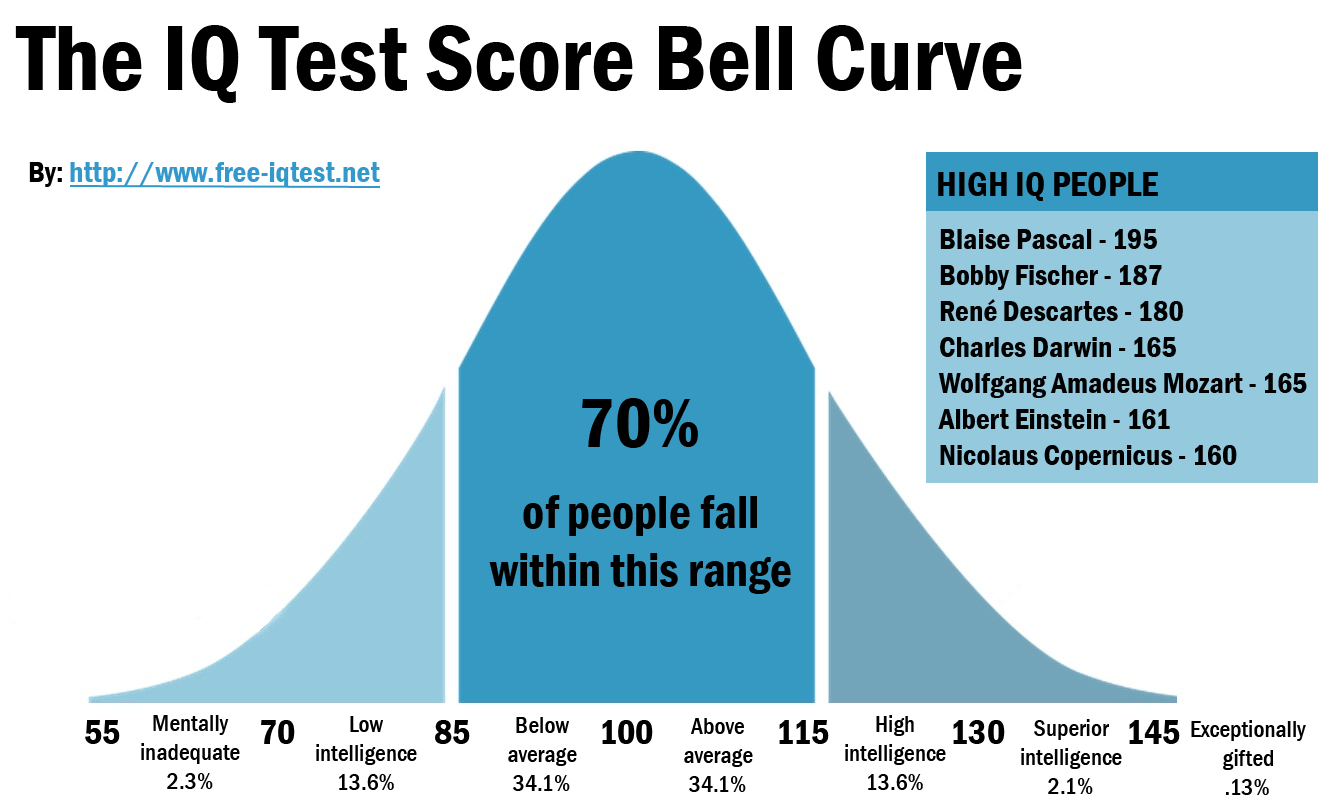IQ Test Scale

| Intelligence Interval | Cognitive Designation |
|---|---|
| 40 – 54 | Severely challenged (Less than 1 % of test takers) |
| 55 – 69 | Challenged (2.3 % of test takers) |
| 70 – 84 | Below average |
| 85 – 114 | Average (68 % of test takers) |
| 115 – 129 | Above average |
| 130 – 144 | Gifted (2.3 % of test takers) |
| 145 – 159 | Genius (Less than 1 % of test takers) |
| 160 – 175 | Extraordinary genius |
What is the IQ scale?
The Intelligence Quotient (IQ) scale is a method used to classify human intelligence levels based on standardized test scores. The tests are designed to measure various cognitive abilities, such as verbal, mathematical, and spatial skills, as well as working memory and processing speed. IQ scores are usually calculated by comparing an individual's test performance to that of a large, representative sample of people of the same age.
The most commonly used IQ scale is based on a normal distribution (bell curve) with a mean (average) score of 100 and a standard deviation of 15. This means that the majority of the population's IQ scores fall within a certain range around the average:
- Below 70: Intellectual disability (about 2.2 % of the population)
- 70–84: Below average intelligence (about 13.6 % of the population)
- 85–114: Average intelligence (about 68 % of the population)
- 115–129: Above average intelligence (about 13.6 % of the population)
- 130–144: Gifted (about 2.2 % of the population)
- 145–159: Highly gifted (about 0.3 % of the population)
- 160 and above: Exceptionally gifted (less than 0.1 % of the population)
It's important to note that the specific classifications and ranges can vary slightly depending on the IQ test being used. Additionally, the IQ scale is just one measure of intelligence, and it doesn't capture every aspect of a person's cognitive abilities, creativity, or emotional intelligence.
IQ Score FAQ
Q: How stable are IQ scores over time?
A: IQ scores tend to be relatively stable throughout adulthood, but they may fluctuate in childhood and adolescence due to factors such as brain development, educational opportunities, and life experiences.
Q: Are IQ scores influenced by genetics or environment?
A: Both genetics and environmental factors contribute to individual differences in intelligence. Studies suggest that genetics play a significant role, but environmental factors, such as quality of education, nutrition, and social interactions, can also impact a person's cognitive abilities.
Q: How reliable are IQ tests?
A: IQ tests are generally considered reliable and valid measures of cognitive abilities. However, they may not capture all aspects of intelligence, and cultural biases can potentially affect test performance. It is essential to consider multiple sources of information when evaluating someone's cognitive abilities.
Q: Can a person's IQ change over time?
A: Although IQ scores tend to be relatively stable throughout adulthood, significant life events, educational opportunities, or health issues can lead to changes in cognitive abilities. It is possible for a person's IQ to change, but significant changes are rare.
Q: Is IQ the only measure of intelligence?
A: No, IQ is only one measure of intelligence, and it primarily focuses on cognitive abilities. Other aspects of intelligence, such as emotional intelligence or creativity, are not fully captured by traditional IQ tests. It is important to consider multiple dimensions of intelligence when assessing a person's abilities.